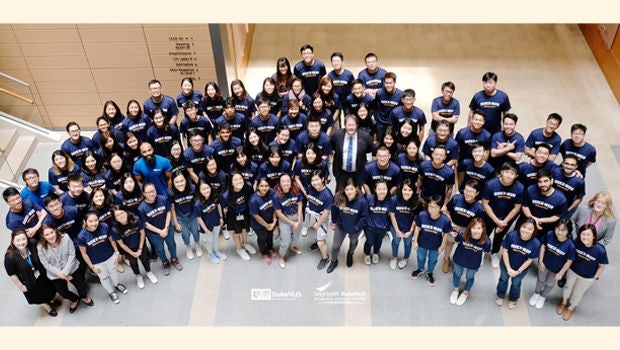
- Innovative approaches ensure that graduating medical students are competent to enter the medical workforce despite challenging COVID-19 control measures
- Possibly, world-first report on the conduct of high-stakes graduation-level clinical examinations during the COVID-19 pandemic
During the COVID-19 pandemic, it is more vital than ever to add well-trained and competent clinicians and medical professionals to the healthcare workforce. As Singapore implemented stringent measures, including social distancing and telecommuting to mitigate the COVID-19 outbreak, the innovative educational system at Duke-NUS Medical School (Duke-NUS) developed a novel strategy to ensure safe and stringent methodology and robust assessment processes to ensure students’ clinical competence.
Duke-NUS academics developed a strategy that meant that the clinical and procedural skills of final year medical students could be safely and reliably assessed in the midst of robust COVID-19 mitigation measures. This ensured that Duke-NUS graduates could safely demonstrate that they had met the required standards for graduation and could begin medical practice without delay. This study, believed to be the first report on the conduct of high-stakes graduation-level clinical examinations, during the COVID-19 pandemic, was published in the journal MedEdPublish in March 2020.
“In response to the COVID-19 pandemic, a number of medical schools around the world cancelled clinical examinations and allowed their final year medical students to graduate and go directly into practice,” says Associate Professor Katharine Boursicot, Duke-NUS’ Associate Dean for Assessment and Progression and corresponding author of the study. “We wanted to ensure that any students we graduated from Duke-NUS were clinically competent and passed our graduation-level clinical examinations.”
To graduate from medical school, students’ skills in history-taking and examining patients with real and simulated conditions are evaluated by experienced clinicians, along with assessments of their basic clinical knowledge and practical, procedural skills. The complexity of these assessments presents a unique challenge when trying to avoid the further spread of COVID-19. Duke-NUS’ robust strategy outlines numerous steps to limit and mitigate this risk.
The central component is a practice called ‘cohorting’, a protocol established in Singapore following the 2003 SARS outbreak and the 2009 H1N1 influenza pandemic. Duke-NUS applied this protocol by separating their 56 final year students into four cohorts of 14 students each. Each cohort of students was assigned to separate examiners and patients. The four groups were not allowed to mix at all.
Examiners and students were briefed on what was expected during the examinations via video conference calls. Real patients were recruited from a pool of people with very stable chronic conditions. All three groups had no travel history or contact with ill persons in the two weeks prior to examination. They were also contacted twice within those two weeks to ensure they were healthy and understood the examination protocols. The health and safety of all were paramount throughout the entire process.
To further limit possible spread of infection, the exams took place in non-clinical, school-teaching facilities. Temperatures of participants were taken before proceeding, and hand sanitisers were available outside and inside examination rooms. Handshaking was not allowed, and social distancing was applied except during physical examinations, where contact was necessary for diagnostic and clinical purposes. The School complied with strict COVID-19 safety and control measures, including ensuring all participants wore masks, practiced strict hygiene and frequent cleaning, maintained careful cohorting of participants and physical distancing.
“Through this innovative strategy, we managed to demonstrate through our final examinations that our students have met our required high standards for graduation. These stringent measures allowed Duke-NUS Medical School to robustly assess and graduate clinically competent new doctors, who could join the medical workforce without delay and contribute to the national effort in overcoming COVID-19,” said Professor Ian Curran, Duke-NUS’ Vice Dean of Office of Education and senior author of the study.
The achievement of successfully conducting a high-stakes, clinical examination was made possible by close collaboration and support from Singapore’s Ministry of Health and chief executives of healthcare institutions, together with the many clinicians who gave their time and expertise to act as examiners, the real and simulated patients, and the huge effort of Duke-NUS administrative staff.
Reference: Boursicot, K., Kemp, S., Ong, T. H., Wijaya, L., Goh, S. H., Freeman, K., & Curran, I. (2020). Conducting a high-stakes OSCE in a COVID-19 environment. MedEdPublish, 9(1). doi: 10.15694/mep.2020.000054.1













 Get it on Google Play
Get it on Google Play